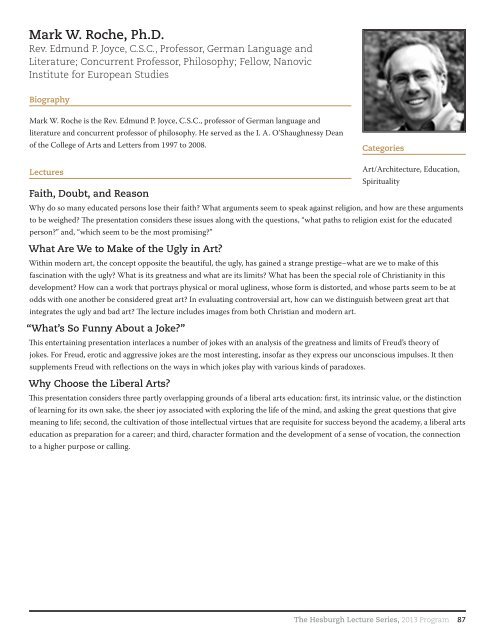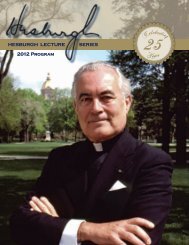HESBURGH LECTURE SERIES 2013 Program - Alumni Association ...
HESBURGH LECTURE SERIES 2013 Program - Alumni Association ...
HESBURGH LECTURE SERIES 2013 Program - Alumni Association ...
You also want an ePaper? Increase the reach of your titles
YUMPU automatically turns print PDFs into web optimized ePapers that Google loves.
Mark W. Roche, Ph.D.<br />
Rev. Edmund P. Joyce, C.S.C., Professor, German Language and<br />
Literature; Concurrent Professor, Philosophy; Fellow, Nanovic<br />
Institute for European Studies<br />
Biography<br />
Mark W. Roche is the Rev. Edmund P. Joyce, C.S.C., professor of German language and<br />
literature and concurrent professor of philosophy. He served as the I. A. O’Shaughnessy Dean<br />
of the College of Arts and Letters from 1997 to 2008.<br />
Categories<br />
Lectures<br />
Art/Architecture, Education,<br />
Spirituality<br />
Faith, Doubt, and Reason<br />
Why do so many educated persons lose their faith? What arguments seem to speak against religion, and how are these arguments<br />
to be weighed? The presentation considers these issues along with the questions, “what paths to religion exist for the educated<br />
person?” and, “which seem to be the most promising?”<br />
What Are We to Make of the Ugly in Art?<br />
Within modern art, the concept opposite the beautiful, the ugly, has gained a strange prestige–what are we to make of this<br />
fascination with the ugly? What is its greatness and what are its limits? What has been the special role of Christianity in this<br />
development? How can a work that portrays physical or moral ugliness, whose form is distorted, and whose parts seem to be at<br />
odds with one another be considered great art? In evaluating controversial art, how can we distinguish between great art that<br />
integrates the ugly and bad art? The lecture includes images from both Christian and modern art.<br />
“What’s So Funny About a Joke?”<br />
This entertaining presentation interlaces a number of jokes with an analysis of the greatness and limits of Freud’s theory of<br />
jokes. For Freud, erotic and aggressive jokes are the most interesting, insofar as they express our unconscious impulses. It then<br />
supplements Freud with reflections on the ways in which jokes play with various kinds of paradoxes.<br />
Why Choose the Liberal Arts?<br />
This presentation considers three partly overlapping grounds of a liberal arts education: first, its intrinsic value, or the distinction<br />
of learning for its own sake, the sheer joy associated with exploring the life of the mind, and asking the great questions that give<br />
meaning to life; second, the cultivation of those intellectual virtues that are requisite for success beyond the academy, a liberal arts<br />
education as preparation for a career; and third, character formation and the development of a sense of vocation, the connection<br />
to a higher purpose or calling.<br />
The Hesburgh Lecture Series, <strong>2013</strong> <strong>Program</strong> 87



